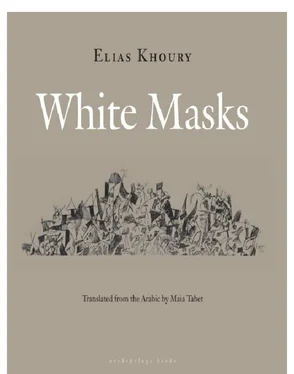Sitt Huda also came. She tried to reassure her: “Fadee can do whatever he wants, Fatimah. He knows all the militiamen in the neighborhood; they look up to him, like a leader,” she said. “Don’t worry! Your husband will return.” And so he did, with Fadee by his side, and his face bleeding.
“Pack your belongings,” Fadee told them, “you’ve got to leave.” They stood side by side, speaking in muffled voices, and Fadee gave Mahmud a key. Then he piled them into the huge American car — it was the first time they’d ever ridden in the family car — and took them to the Museum.
“I’ll never forget that car,” Fatimah told her husband as they entered the building in Kantari. He told her this was their new house. A proper house it was too, with a TV, a radio, a fridge, everything. “What a beautiful, comfortable car that was,” Fatimah went on, as the children played in the courtyard and her husband puffed away on his cigarette, telling her they’d all be dead if it hadn’t been for Fadee. .
“He’s a good guy, you know… as soon as I heard his voice, I relaxed. . it was as if I could see him from behind that brown sack they put over my head. You should have heard him cussing them out. . he was the one who got me out of there. . they wanted to kill me, you know, but he told them, ‘Leave him alone, you sons of bitches, this one’s mine, he’s none of your business!’ He grabbed me by the hand and said, ‘Let’s go.’ As we walked out together, he took the sack off my head. The sons of bitches, you know what they did, they hit me again! And instead of bandaging me up, they put the brown sack back over my head. And even though Fadee was right there beside me, saying let’s go, they had the nerve to stick the muzzles of their guns into the back of my head! I tried to look back, but Fadee said not to turn around, and I listened to him because he knows best.
As she looked at Mahmud, Fatimah couldn’t help thinking that it was all over — with Fadee on the other side now and Ali dead. And him, here, in her face grumbling all day, and this building full of Armenians and rich khawajas, all of them trying to leave the country. . she’d have to stay home now, nobody would be asking her to clean for them. . life was better over there. She didn’t know anybody here, what kind of a life was that?
And then all hell broke loose.
Mahmud told her the war had started again, and he was worried about them. He said he’d found another building for them to live in and that they had to leave Kantari; as it was now overrun with militiamen. They gathered up their belongings once again and left. Only this time, Mahmud wouldn’t live in the new building with them. He would stay in Kantari by himself. When she questioned him, he said he knew best.
“Men know best,” he said, “and it is proper that they leave.” And he left.
All their stuff, and the children screaming, and the new building, and the man who comes out in his pajamas every morning cursing the war, and Basheer al-Harati, the fat landlord, who looks down on Mahmud and loathes the children, and is constantly fussing about keeping the stairwell clean. .
And me, Fatimah Fakhro, here with seven children. . my eldest, only seventeen, working at Hajj Saleh’s, the dry cleaner, and my youngest still nursing at my breast. . Standing here alone before these men asking about Khalil Ahmad Jaber. I told them he died. Everyone dies, I said. . Just the same as that time when I stood there all alone, calling Sitt Huda to tell her that Mahmud was dead and the building in Kantari was destroyed. When Fadee answered, his voice sounded listless and rasping, like creaking bones. He talked to me as if I were a stranger. He said Sitt Huda had gone to Paris, Khawaja Mitri had passed away, and he hadn’t much time now. . why didn’t I call back some other time. .
I stood all alone before these men, bristling with wrath and indignation, and told them I didn’t know anything. They wouldn’t believe me. What was I supposed to tell them? I didn’t know what they wanted, I just wept. We know everything, they said, but it wasn’t true, because after I talked to them, they took me back home. I’m all by myself now, and if it hadn’t been for Professor Nabeel, the children and I would have been thrown out into the street, plain and simple! Everything’s been such a disaster! Why, oh why, did Mahmud have to bring us here…?
Fatimah was always alone with the kids. Mahmud disappeared for days at a time, and then he would reappear, hand her some money — God only knows where he got it from — and vanish again. When she asked where he was going, he’d tell her he was still in Kantari.
“I’m the building watchman. The war will end and Khawaja Fadee will be back. He asked me to be the watchman. How can I leave the building in Kantari?”
And Fatimah would tell him please don’t go. “There’s fighting over there, why can’t Mr. Fadee come and guard his own building? There’s fighting over there. .” she would cry, frightened.
And where was Mahmud now, when she needed him, with this man sprawled out on the sidewalk, staring vacantly into space? She’d found him one winter night — it was cold and raining, and there he was, bundled up in his coat on the sidewalk, with his straggly beard, a pith helmet on his head, and a bucketful of quicklime at his side. He asked her for some bread, so Fatimah went in and fetched him bread, some olives, and an onion. She asked him his name.
Spitting out an olive pit, he coughed and told her she was a wonderful woman. Then he started talking about his mother.
“My mother, Hajjeh Sobhiyyeh, went on the hajj and she never came back. They said she got some disease and died over there, and they buried her by the Prophet’s grave. Hajjeh Sobhiyyeh, my mother, was a beautiful woman, she was fair and sweet! Whenever my father used to hit her, I’d run and hide under her skirts, and look up her long, milky-white legs as he pinned her against the wall. And though she cried from the insults and the blows, she would stay ever so still so as not to trample me. She’d slide her hand down to comfort me, even though he kept hitting her, over and over again.
“My mother died over there, beside the Prophet’s grave. I bought her the plane ticket and she left. We put up all manner of bunting and decoration for her return-I got a sheep that I tied up in front of the building for the ceremonial slaughter. But when she didn’t come back, and the sheep was still there, everyone said I should slaughter it for the peace of her soul, that’s what the sacrificial lamb of the feast is. So I went and got Abu Khaled, the butcher. Little Ahmad was just a child at the time. Abu Khaled grabbed the sheep, pinned it to the ground, and slit its throat with a knife. . oh my, you should’ve seen the blood. . I couldn’t help but cry when the blood spurted out and spattered everything. . then Abu Khaled bent down, blew into the sheep with the bellows and then set to skinning it. Me and my Ahmad, we were both crying, and Hajjeh Sobhiyyeh never came back.”
Fatimah asked him his name once again; he tells her with his mouth full and carries on eating.
“Are you married?”
“I am, and my son Ahmad, the Lord be praised, has grown into a fine young man. . he’s an officer in the army now.”
“In which army?”
“ The army! The Lebanese army, he’s the best officer they’ve got! As a matter of fact, I’m expecting him at this very moment. . a military jeep should be here any minute now to take me to his office at the barracks. . and there, the soldiers will line up on either side and salute as I review the troops, the way the president does, only better.”
Fatimah went back inside and glanced over at Ali’s picture. Mahmud still wasn’t back. Then they came and told her the Kurds of Wadi Abu Jameel had killed him. But they hadn’t, because he did come back, and they hadn’t killed him. No one could kill him, he told her. Then, after the war ended, they came and sprayed him with bullets and left his bloodied body riddled with holes, lying in a pool of shards from the shattered glass panes of the building lobby.
Читать дальше












